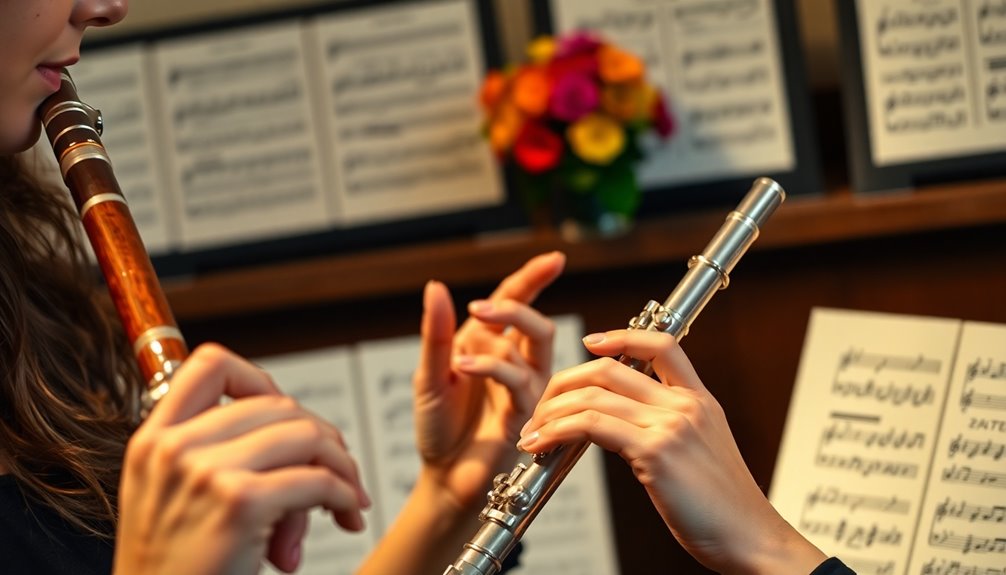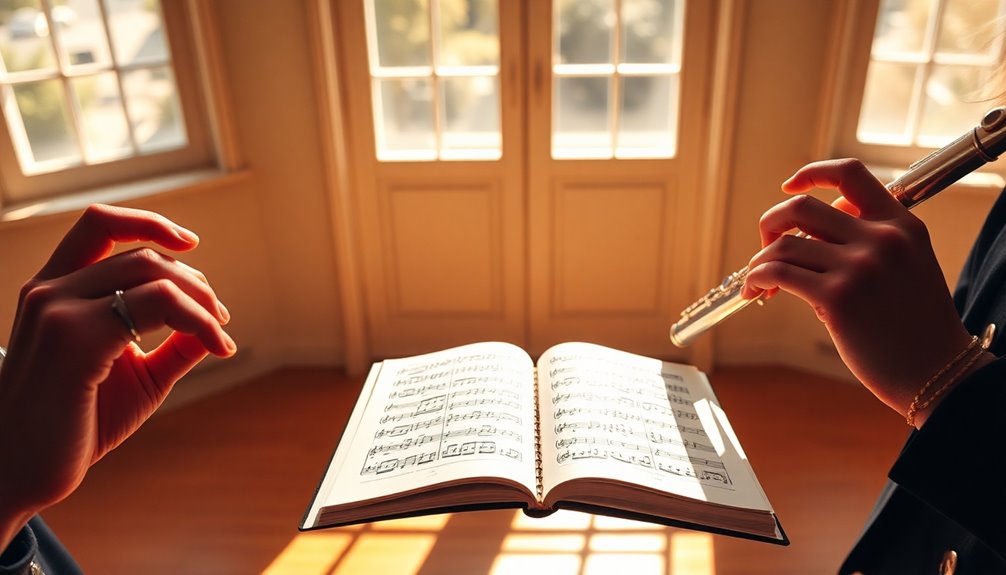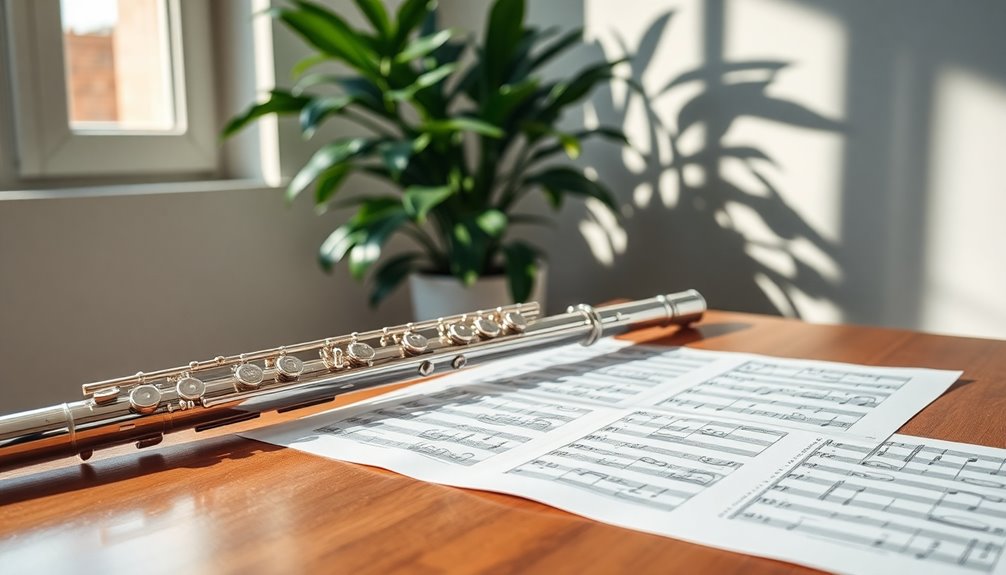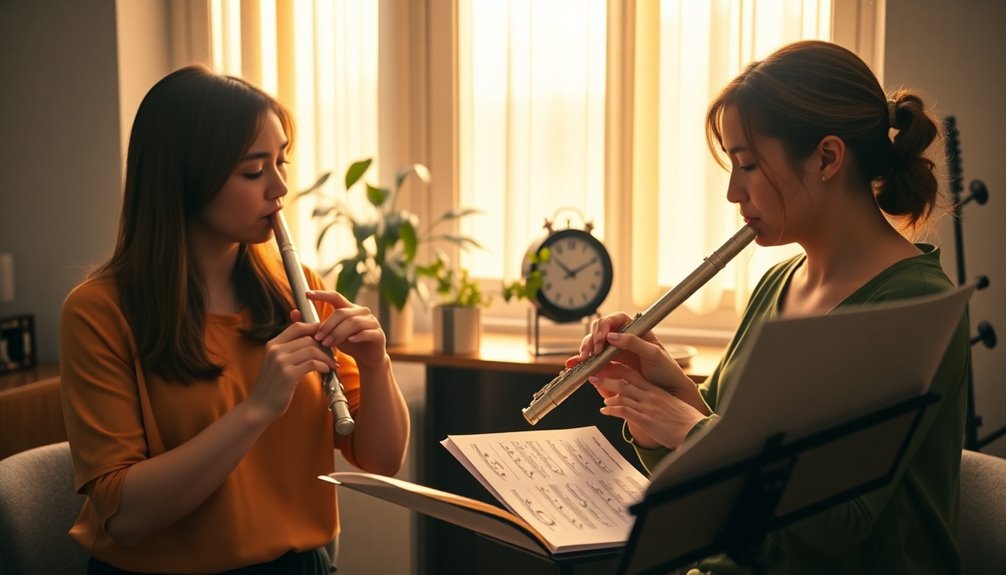If you're looking to enhance your flute playing alongside a friend, consider exploring several engaging duets. Start with classic pieces like Mozart's "Duo for Flute and Harp" for a solid foundation. For a rich experience, try Baroque favorites from Bach and Vivaldi—perfect for musical dialogue. If you're feeling adventurous, contemporary works by André Jolivet or Ian Clarke will push your creativity. Don't forget the joy of folk tunes like "Scarborough Fair," which add a fun, communal spirit. For romantic occasions, pieces like "The Flower Duet" set the perfect mood. Discover even more exciting options ahead!
Key Takeaways
- Explore classic duets like Mozart's "Duo for Flute and Harp" to develop essential flute techniques and enhance timing and dynamics.
- Try Baroque pieces by Bach and Vivaldi for rich harmonies and emotional depth, fostering a musical dialogue between players.
- Experiment with contemporary works like André Jolivet's "Cinq Incantations" for innovative compositions that encourage personal interpretation and dynamic exploration.
- Enjoy folk tunes such as "Scarborough Fair" and "Danny Boy" to promote a sense of community and cultural connection through music.
- Select romantic duets like "The Flower Duet" to create intimate atmospheres for special occasions with engaging dynamics and harmonies.
Classic Duets for Beginners

When you're starting your flute journey, classic duets can be a fantastic way to develop your skills while having fun with a friend. These pieces often feature simple melodies that are perfect for beginners, allowing you both to focus on essential techniques without feeling overwhelmed.
Playing together not only strengthens your musical bond but also deepens your understanding of rhythm and harmony.
One excellent choice for duets is Mozart's "Duo for Flute and Harp." While it may seem advanced, many arrangements simplify the flute part, making it accessible for beginners. By practicing this piece, you'll work on your timing and breath control, essential beginner techniques that will serve you well as you progress.
Another great option is Beethoven's "Ode to Joy." This well-known melody is easy to grasp and can be played at various skill levels. As you and your friend play, you'll develop a sense of ensemble playing, learning to listen and adapt to each other's timing and dynamics.
Don't forget about "Minuet in G" by Bach. Its catchy, simple melodies provide a perfect canvas for experimenting with expression and phrasing.
Playing these pieces together can motivate you to practice regularly, as the enjoyment of making music with a friend amplifies the learning experience. Additionally, engaging in community resources like flute clubs can enhance your duet playing by providing valuable feedback and support from fellow musicians.
Contemporary Pieces to Explore

Exploring contemporary pieces can open up a whole new world of musical expression for you and your friend. Modern composers are pushing the boundaries of what flute duets can achieve, and diving into their works will inspire both of you. You'll discover innovative arrangements that blend traditional techniques with fresh sounds, allowing for a vibrant musical dialogue.
One excellent piece to try is "Cinq Incantations" by André Jolivet. This work showcases a unique mix of rhythmic significance and lyrical beauty, making it a perfect choice for flutists looking to explore contemporary textures.
Another wonderful option is "Dancing with the Wind" by Ian Clarke, which features extended techniques that can challenge and excite both players.
Don't overlook the music of Jennifer Higdon, whose "Winged Creatures" captures the essence of nature through intricate melodies and harmonies. These pieces not only provide a challenge but also foster a deeper connection between you and your duet partner. Exploring unique soundscapes through these contemporary works enhances your performance and encourages creativity.
As you navigate these modern compositions, you're not just playing notes; you're collaborating in a shared journey of discovery. Encourage each other to experiment with interpretations, dynamics, and expressions.
Popular Duets From the Baroque Era

Have you ever wondered how the intricate harmonies of the Baroque era can enhance your flute duets? The music from this period is rich with emotion and complexity, making it a perfect choice for you and a friend to explore together. Among the most notable works are the Bach Sonatas and Vivaldi Concertos, both of which offer enchanting melodies and engaging counterpoints that will elevate your playing experience. Additionally, these compositions provide opportunities for techniques for technical skills development that can enhance your overall flute proficiency.
Here's a quick overview of some popular duets you might want to try:
| Composer | Piece |
|---|---|
| J.S. Bach | Sonata in E-flat Major, BWV 1031 |
| J.S. Bach | Sonata in A Major, BWV 1032 |
| A. Vivaldi | Concerto in C Major, RV 444 |
| A. Vivaldi | Concerto in D Major, RV 429 |
| A. Vivaldi | Concerto in G Major, RV 439 |
These selections not only showcase the technical prowess required but also allow for deep musical conversations between you and your duet partner. As you practice, you'll find that the dialogue created by the intertwining flutes creates a sense of camaraderie and connection. Embracing these Baroque masterpieces will not only enhance your skills but also deepen your relationship with your fellow musician. So grab your flutes and plunge into the world of Bach and Vivaldi; you won't regret it!
Fun Folk Tunes to Play

Folk tunes bring a joyful spirit and a sense of community to your flute duets, making them a delightful choice for you and a friend. These traditional melodies often reflect the heart and soul of different cultures, allowing you to explore a rich tapestry of sounds while enhancing your musical bond.
Start with classics like "Scarborough Fair" or "Danny Boy." These tunes not only sound beautiful, but they also carry stories that resonate across generations. You and your friend can easily adapt the melodies, integrating your own interpretations into the performance. This flexibility encourages creativity and collaboration, making your practice sessions more enjoyable.
Don't overlook the cultural variations of folk music. Try playing tunes from diverse traditions, such as the lively Irish jigs or the soulful Appalachian ballads. Each piece offers unique rhythms and harmonies that can challenge your skills and broaden your musical horizons. Incorporating traditional scales and rhythms can further enhance authenticity in your performances.
As you play, you'll discover how these melodies connect you to the larger world of music and the shared experiences of people everywhere.
Additionally, consider arranging your own versions of folk tunes. Experiment with harmonies and counter-melodies to create a truly personalized duet. This not only deepens your understanding of the music but also fosters a stronger connection between you and your duet partner.
Incorporating fun folk tunes into your flute duets won't only enhance your playing but also create cherished memories. So grab your flutes, invite a friend, and let the music carry you both away!
Romantic Duets for Special Occasions

After enjoying the lively melodies of folk tunes, you might want to set a different mood with romantic flute duets perfect for special occasions. Whether you're celebrating an anniversary, a wedding, or simply creating intimate moments with someone special, these duets can transform the atmosphere. Here are some lovely selections that can help you express those heartfelt emotions through music.
| Duet Title | Description |
|---|---|
| *The Flower Duet* | A classic love song that evokes tenderness and beauty. |
| *Romance from "Romeo and Juliet"* | A passionate piece that captures the essence of love. |
| *Meditation from "Thaïs"* | This serene melody creates a reflective, intimate mood. |
| *My Heart Will Go On* | Nostalgic and powerful, perfect for unforgettable moments. |
Playing these love songs together can deepen your connection and allow you to share those enchanting moments. As you explore the melodies, focus on the dynamics and harmonies to create an engaging experience for both you and your partner. Additionally, these duets offer a valuable resource for both pleasure and skill development, making them ideal for enhancing your musical abilities together.
Unique Compositions for Advanced Players

For advanced flute players seeking to challenge their skills and expand their repertoire, exploring unique compositions can be a rewarding experience.
You'll find that these pieces not only push your technical boundaries but also invite you to experiment with your artistic expression. Look for compositions that incorporate complex harmonies or unconventional time signatures. These elements create a rich tapestry of sound, allowing you and your duet partner to showcase your musicality in new and exciting ways.
One standout piece to contemplate is Paul Hindemith's "Aria." This composition features intricate lines and offers an excellent opportunity for you to explore the depths of melody and harmony. The interplay between the two flutes encourages creative communication, making it perfect for an intimate performance.
Another gem is "Duo for Flute and Clarinet" by André Jolivet. Although originally written for flute and clarinet, it translates beautifully for two flutes. The improvisational techniques it encompasses will inspire you to infuse your own personality into the performance, fostering a deeper connection with your partner.
Lastly, don't overlook contemporary compositions that challenge traditional forms. Many modern composers are experimenting with sound, rhythm, and structure, which can lead to engaging duets that resonate with today's audience. Additionally, the use of high-quality materials in instruments can significantly enhance the overall sound quality of your performances.
Tips for Successful Duet Practice

Successful duet practice hinges on effective communication and collaboration between partners. To truly make the most out of your time together, it's crucial to create a supportive environment where both of you can thrive.
Here are some tips to guarantee your duet practice is both enjoyable and productive:
- Set Clear Goals: Before each session, discuss what you'd like to achieve. Whether it's mastering a specific section or refining dynamics, having a target keeps you focused.
- Create Practice Schedules: Consistency is key. Coordinate with your partner to establish regular practice times, so you both prioritize your duet.
- Provide Constructive Feedback: Share your thoughts about each other's playing, but do it positively. Effective communication means being honest while also supportive.
- Record Your Sessions: Listening back to your practice can reveal areas for improvement that you mightn't notice in the moment. Plus, it's a great way to track your progress!
- Have Fun Together: Don't forget to enjoy the process! Incorporate games or improvisation into your sessions to keep things light and engaging.
- Incorporate Breathing Exercises: Practice breathing exercises together to enhance lung capacity and support, making your duet sound more cohesive.
Frequently Asked Questions
What Are the Best Flutes for Playing Duets?
When you're looking for the best flutes for playing duets, consider reputable flute brands like Yamaha, Gemeinhardt, and Azumi.
Each offers models that complement duet techniques, enhancing your musical collaboration. A solid flute can improve tone and intonation, making it easier for both players to harmonize.
Try different brands to find the right fit for you and your duet partner, as comfort and sound quality are key to creating beautiful music together.
How Do I Find a Duet Partner?
Finding a duet partner can feel like searching for a needle in a haystack, but it doesn't have to be intimidating!
Start by exploring online communities where fellow musicians gather—social media groups or dedicated forums are great places to connect.
Share your interests and let others know you're looking for a partner.
You'll find that many are enthusiastic to collaborate, fostering a sense of belonging and musical camaraderie.
Happy hunting!
Can I Play Flute Duets Alone?
Absolutely, you can play flute duets alone! In solo practice, you can use a flute arrangement designed for two players, allowing you to explore both parts.
By recording one part and playing along, you create a fuller sound, enhancing your experience. This approach not only hones your skills but also gives you the joy of music-making without needing another person.
What Skills Should I Improve for Duet Playing?
To excel in duet playing, focus on intonation awareness and rhythmic precision.
You'll want to develop a keen ear for matching pitches while listening closely to your partner. Practicing scales and harmonies together can enhance your intonation skills.
Additionally, work on keeping a steady tempo and synchronizing your rhythms. These skills create a cohesive sound, allowing you both to connect musically.
Embrace the journey together, and enjoy the beauty of collaboration!
How Do I Choose the Right Duet Piece?
Choosing the right duet piece can feel like searching for a needle in a haystack!
Start by considering your style preferences and what resonates with both you and your partner.
Next, assess your skill levels to guarantee the piece is challenging yet enjoyable.
Look for a balance between fun and technicality.
Finally, don't hesitate to explore different genres; you might stumble upon a hidden gem that strengthens your bond through music!
Conclusion
So, whether you're channeling the harmonious enchantment of Mozart or the lively spirit of a folk tune, diving into flute duets can elevate your musical journey. Remember, like the timeless partnership of Orpheus and Eurydice, your collaboration can weave magic through sound. Embrace these diverse pieces and don't shy away from experimenting together. With practice, you'll not only enhance your skills but also create unforgettable memories. Grab your flute, and let the music begin!






